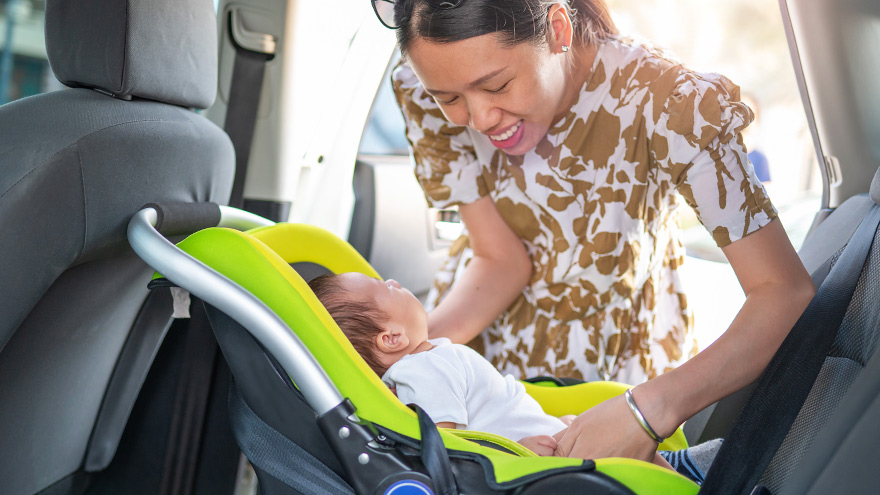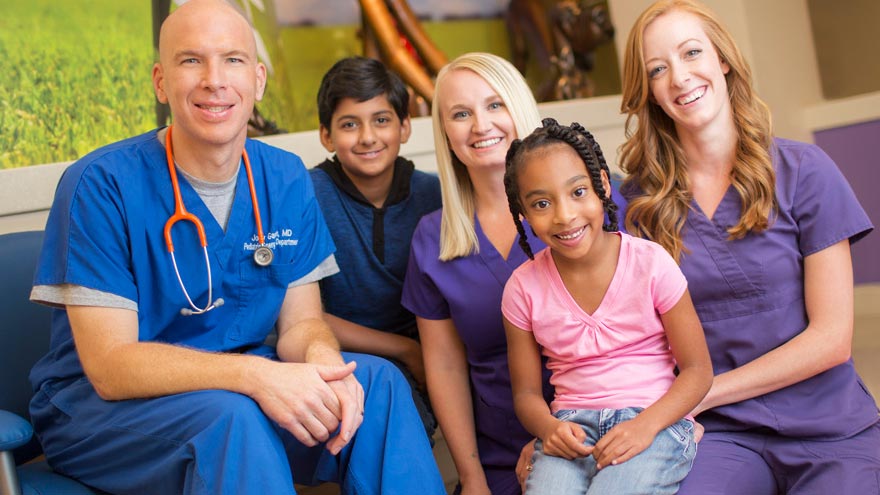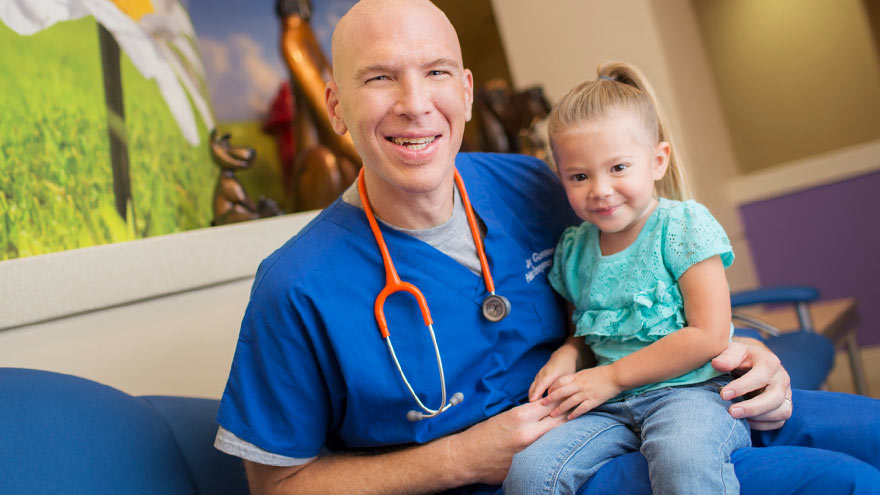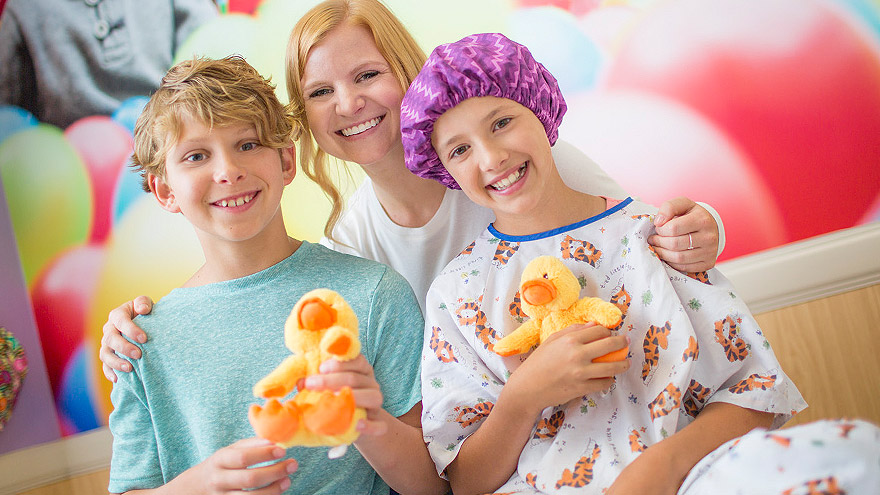Search
Results for 'emergency'
Clear-
How to Protect Your Kids from Heatstroke
Summer is around the corner, bringing heightened risks of heatstroke, especially for children who cannot regulate their body temperature as efficiently as adults. Infants are particularly vulnerable and may not express discomfort, so never leave a child unattended in a vehicle. Top Tips for Preventing Heatstroke Reduce the number of deaths from heatstroke by remembering to ACT. Avoid heatstroke-related injury and death by never leaving a child alone in a car, not even for a minute. And make sure to keep your car locked when you’re not inside so kids don’t get in on their own. Create reminders. Keep a stuffed animal or other memento in your child’s car seat when it’s empty, and move it to the front seat as a visual reminder when your child is in the back seat. Or place and secure your phone, briefcase or purse in the backseat when traveling with your child. Take action. If you see a child alone in a car, call 911. Emergency personnel want you to call. They are trained to respond to these situations Keeping Your Baby Cool in the Back Seat In hot weather, it is crucial to keep your baby cool and hydrated by using a car seat cover or towel over them to reflect the sun's rays. Dress your baby in lightweight clothing that covers their arms and legs. Keep an eye on your baby's skin color. Move them to a cooler place if they look too red or flushed. Keep the temperature at a comfortable temperature for you, not for your child. Keep the windows cracked open for ventilation and ensure nothing is blocking the airflow from entering or exiting the vehicle. Dress your infant appropriately for their environment, including appropriate head and neck coverings, to keep them cool and protected from sunburns. Ensure you have enough fluids to last an hour before getting out of the car or use bottled water if possible. Never leave your child unattended in a car. Steps to Follow if You Suspect Heatstroke Call 911 immediately. Cool the victim – Get the person to a shady area, remove restrictive clothing and cover skin with sheets soaked in ice-water, and place ice packs in the arm pits and groin. Have the victim drink cool fluids, preferably an electrolyte-containing sports drink. Monitor body temperature with a thermometer but stop cooling efforts after temperature has dropped to 102 Fahrenheit. Baby Safe Classes These classes help prepare parents for emergencies that may occur in baby’s first year. Safe Kids Worldwide Did you know heatstroke is the leading cause of non-crash related fatalities in children? “On average, every 10 days a child dies from heatstroke in a vehicle. In more than half of these deaths, the caregiver forgot the child was in the car.”
-
Children's ER, Urgent Care or Wait it Out? Here's Your Guide
We’ve all been there: Your child gets sick right after urgent care closes — or worse, in the middle of the night. So do you wait it out, or do you load up and head to the Children’s ER? Pediatric Emergency Physician Joey Gassen, MD, with Northern Nevada Emergency Physicians, has insight. As parents, we often wish we had all the answers. And while a short-and-sweet comprehensive parenting guide is elusive, we can help if your questions involve whether to go to the children’s ER or wait it out. Here, a pediatric emergency physician explains when you should take your child to the Children’s ER at Renown Children’s Hospital, and what makes a children’s ER different. How do you know when it’s time to take your child to the ER? Having a sick or injured child is stressful. If you have a true emergency, you should go straight to the ER or call 911. When to go to the ER: Allergic reactions Asthma or severe shortness of breath Fever (infants less than two months old) Choking or poisoning Coughing up or vomiting blood Fainting, confusion or seizures Fractures or broken bones Head injuries Severe bleeding If you determine your child’s condition isn’t life-threatening but needs to be taken care of right away, urgent care is the best choice. Those conditions include: Cold and flu Coughs and sore throat Fevers Vomiting, diarrhea, stomach pain Cuts and severe scrapes Minor injuries and burns What is different about Renown Children’s ER compared to the adult ER? The difference starts when you first bring your child in. We have a lobby dedicated to our community’s smallest patients. The 24/7 lobby incorporates a child-friendly atmosphere with vibrant colors to help decrease anxiety that can accompany emergency situations. Our children’s ER also has equipment sized just for kids of any age. We offer a distraction machine, as well as games and movies, to help children cope with what can be a traumatic experience, like getting an IV. In addition, we have Child Life Specialists available to provide the emotional support to both children and their families. Why is it important to have an emergency room and lobby open 24/7 dedicated to children? Children aren’t just little people. They have special needs that require specialized care. Our children’s ER is staffed with skilled physicians and pediatric nurses certified in advanced pediatric emergency care to give your child the highest level of support. Renown Children’s Hospital From newborns to teens, Renown Children’s Hospital offers many different services and treatments designed specifically to take care of our community’s children. We provide a range of specialized services — from a dedicated Children’s ER and Pediatric ICU to a children’s imaging center and child’s asthma program. Explore Children’s Services
Read More About Children's ER, Urgent Care or Wait it Out? Here's Your Guide
-
Keeping Pediatric Care Close to Home
As our community grows, so does the need for specialized care. Thanks to a generous gift, there’s a healthier future for families in the region as a $7.5 million gift to the Renown Health Foundation is helping keep care close to home. Being in the hospital is often a stressful experience, especially for a child and their caregivers. If you add the need to travel out-of-state for care into the mix, unnecessary anxiety and financial burdens can be placed on a family that is already worried about a sick child. With our quickly growing community and close to 100,000 children under the age of 18 in Washoe County alone, the need for local specialty care is needed. The William N. Pennington Foundation recognized this need and donated $7.5 million to the Renown Health Foundation – the largest gift the health system has received – to keep care close to home and establish the William N. Pennington Fund for Advanced Pediatric Care. Thanks to this gift, Renown Children’s Hospital has hired more than 15 pediatric specialists who provide care for children in our community. Below, we introduce you to three key specialized pediatricians in northern Nevada: Joseph A. Gassen, M.D. “Having pediatric specialists in the community is invaluable,” says Joseph A. Gassen, M.D., pediatric emergency medicine. “It allows families and patients to stay in Reno and not have to travel far distances to get quality care.” Gassen, the only doctor specializing in pediatric emergency medicine in the region, moved to Reno to provide care in the emergency room at Renown Children’s Hospital. “The hospital is dedicated to improving the care of children in northern Nevada, and I wanted to be a part of this amazing vision," Dr. Gassen says. I would not have been able to relocate to Reno without the support from the hospital and the William N. Pennington gift.” Working with children and their families are what Dr. Gassen finds most rewarding. "I get to provide care for a child, which in turn makes the parent feel better,” he says. “Essentially, I get to treat the whole family, even though I only directly care for the kids.” Colin Nguyen, M.D. Also among the first new specialists is Pediatric Neurologist Colin Nguyen, M.D., who has done extensive work with epilepsy and epilepsy surgery. “In any growing and expanding community, we need the multitude of social, financial, political and well-being services to sustain that growth and progress,” Dr. Nguyen says. “The ability to offer more breadth of medical services to our local population allows families to spend more time together and fulfill work obligations, without the need to travel long distances to obtain that specialized care.” Dr. Nguyen says he enjoys caring for children because they are honest in their emotions and reactions, as well as simple in their intentions. “It is the overall joy and unique sadness that comes in working with children, which drives many of us to continue our work -- I am no exception.” Jacob Zucker, M.D. The third pediatric specialist providing care thanks to the Pennington gift has close ties to northern Nevada. Jacob Zucker, M.D., pediatric hematologist-oncologist, was born and raised in Reno and attended medical school at the University of Nevada, Reno School of Medicine before moving to the Midwest for his residency and fellowship. Dr. Zucker feels fortunate to have been offered the opportunity to return home and give back to the community that has given so much to him. “I can say with absolute resolve that northern Nevada is an exceptional community to practice medicine in. The care offered here at home is top rate and the providers that live and practice here truly understand the purpose of community.” The addition of these three specialists and the future specialists that will be coming to our area will impact thousands of children and their families. “With a growing population, the vision of leadership at Renown, and with the generosity of the William N. Pennington Foundation, northern Nevada is in position for the first time to make local pediatric subspecialty care a reality and to keep our families at home in their community,” Dr. Zucker says.
-
What Is the Role of a Child Life Specialist?
What is the role of the child life specialist? Here are common questions and answers about how these special individuals give both parents and kids peace of mind. Let’s face it: A hospital can be an intimidating place for just about anyone. But add in being a small human with very little worldly experience — aka a child — and it’s easy to imagine how overwhelming a hospital visit can be. Enter the role of the child life specialist. Liz Winkler, a child life specialist with Renown Children’s Hospital, explains how a Renown program puts young patients and their families at ease. What does a child life specialist do? Child life specialists help young patients develop ways to cope with the anxiety, fear and separation that often accompany the hospital experience. They give special consideration to each child’s family, culture and stage of development. As professionals trained to work with children in medical settings, specialists hold a bachelor’s or master’s degree in the areas of child life, child development and special education or recreational therapy. Our child life specialists are also professionally certified and affiliated with the national Child Life Council. Child life specialists also offer tours of Renown Children’s Hospital for families whose children are scheduled to have surgery. Child life supports children and families by: Helping children cope with anxiety, fear, separation and adjustment Making doctors, needles and tests a little less scary Providing art, music and pet therapy Organizing activities Addressing your concerns Telling you what to expect Creating a therapeutic and medical plan Offering a hand to hold What else is available at the Children’s Hospital that helps ease some of the stress of a hospital visit? Whether it’s seeing a pediatrician, getting a sports physical or looking for advice, our care is centered on supporting and nurturing patients and families at our many locations. We have kid-friendly environments to help ease some of the stress of a hospital visit. These include colorful exam rooms, kid-friendly waiting and common areas, and medical equipment designed especially for children. Our children’s ER is open 24 hours a day, seven days a week. So parents and caregivers have access to emergency care tailored to little ones — anytime, day or night. We have several pediatric specialists on the Renown team in areas including diabetes, emergency medicine, neurology, pulmonology, blood diseases and cancer. How can parents start to ease their children’s mind when they know a hospital visit is in the future? As with many things in life, good preparation can help kids feel less anxious about the experience and even get through recovery faster. It’s important to provide information at your child’s level of understanding, while correcting any misunderstandings, and helping to eliminate fears and feelings of guilt. If you’re anxious and nervous, your child may reflect these feelings and behaviors. So make sure you educate yourself, feel comfortable with the process, and get your questions answered.
Read More About What Is the Role of a Child Life Specialist?
-
Tummy Trouble? Renown Children’s Hospital Adds Another New Specialty, Pediatric Gastroenterology
Two pediatric gastroenterologists bring life-saving care to kids and make Renown their new home The Renown Children’s Hospital team and our community is celebrating the addition of a new life-saving pediatric specialty to its practice serving children and families in northern Nevada. Parents and guardians will now be able to seek professional pediatric gastroenterologist care with the addition of Drs. Juan Gregory and Kathleen Holland to Renown Medical Group. “Recognizing the importance of diagnosing and caring for children who have conditions that affect the organs in the digestive system, including the stomach, liver and bowel, while also helping children who have issues feeding and eating, is critically important to us at Renown,” said Kristina Deeter, MD, MBA, FAAP, Chair of Pediatrics, University of Nevada Reno School of Medicine (UNR Med) and Physician-in-Chief, Renown Children’s Hospital. “Both Drs. Gregory and Holland are superb clinicians, we are excited to have them join Renown Children’s Hospital to offer pediatric gastroenterology services, including a wide range of complex and vital procedures and screenings, endoscopies and colonoscopies.” Juan Carlos Gregory, MD, has 18 years of experience caring for children in northern Nevada. He is a clinical associate professor of pediatrics at UNR Med with a special interest in celiac disease, abdominal pain, and gastroesophageal reflux in children. Gregory earned his undergraduate degree at Texas Christian University in Fort Worth, TX before completing his medical training, including a residency in pediatrics at the University of San Diego in Pediatrics and fellowships in Pediatric Gastroenterology and Nutrition at both Children’s National Medical Center in Washington, DC, and at the National Institutes of Health, Digestive Disease Section in Bethesda, MD. He is board-certified in Pediatric Gastroenterology and speaks Spanish. Kathleen Holland, MD, MPH brings a global health perspective to her work caring for children. A graduate of the University of Nevada Reno School of Medicine (UNR Med) with her medical doctorate and her master’s in public health with a social and behavioral health emphasis, she has donated her skills to providing international medical relief for children in Uganda and Nicaragua. Holland earned her undergraduate degree at University of Nevada Reno in Biology, Health Ecology and Healthcare Ethics before completing her medical training and residency in Pediatrics and a fellowship in Pediatric Gastroenterology at Indiana University School of Medicine in Indianapolis, IN. Her research and scientific interests include vaccination rates and family barriers among children with inflammatory bowel disease, Crohn’s and colitis, pediatric autoimmune pancreatitis, and cystic fibrosis. How Pediatric Gastroenterologists Help Children and Families The Pediatric Gastroenterology Program at Renown Children’s cares for children experiencing common GI-related problems of childhood; nausea, vomiting, abdominal pain, diarrhea, constipation, reflux, colic, milk protein allergy, poor growth and feeding difficulties, and sees patients from infancy to 18 years old. “As specialists in the care of children with gastrointestinal and liver problems, we focus on the diagnosis and treatment of these issues,” said Larry Duncan, MD, Vice President of Pediatrics and Surgery & Administrator of Renown Children’s & Women’s Services. “Our physicians play an active role in teaching and research. We have several areas of expertise including prevention, diagnosis and treating disease of the digestive tract including the esophagus, gallbladder, stomach, pancreas, colon, small intestine and liver disease.” Special expertise includes: Pediatric feeding and growing disorders Aerodigestive disorders Food and hypersensitivity disorders Inflammatory bowel disease Celiac disease Liver diseases Children requiring parenteral and enteral nutrition Renown Children’s Hospital is the only dedicated children’s hospital in northern Nevada, offering programs and services for families from a 100,000 square mile area, from Sacramento, CA to Salt Lake City, Utah. Renown Children’s provides the area’s only Children’s Emergency Room, Pediatric ICU (PICU), children’s imaging center and the largest neonatal ICU (NICU), a level III intensive care unit. Specialty Children’s Care at Renown Today, over 90% of families in northern Nevada seek care from the experts at Renown Children’s Hospital. “We are so grateful to the William N. Pennington Foundation for its support in establishing the William N. Pennington Fund for Advance Pediatric Care in 2016, which allowed us to hire our first 15 pediatric specialists,” said Dr. Deeter. “Today we have over 40 pediatric physician specialists at Renown Children’s Hospital who provide care in adolescent medicine, pediatric endocrinology, pediatric hematology/oncology, pediatric pulmonology, pediatric neurology, pediatric nephrology, pediatric infectious diseases, pediatric ophthalmology, pediatric orthopedic surgery, pediatric cleft and craniofacial surgery, pediatric urology, pediatric dentistry, pediatric emergency medicine, and now, pediatric gastroenterology. Our clinicians provide 30,000 patient visits annually, offering an exceptional level of care. The Pennington gift is truly a gift that keeps giving to the families in our area.” Now Being Constructed: Expanded Inpatient Care at Renown Children’s Hospital New construction of an expanded Neonatal Intensive Care Unit (NICU) with increased capacity to 49 bassinets, an expanded Pediatric Intensive Care Unit (PICU) with increased capacity to 16 private patient and family rooms, and a new Renown Children's Hospital inpatient floor with increased capacity for 38 private patient and family rooms for a total capacity of 58 pediatric beds are currently being constructed on Tahoe Tower, Level 5 of Renown Regional Medical Center. It is expected that the new units will open to patients and families in April 2023. In the most recent US News & World Report Best Hospital rankings, Renown Regional Medical Center was named as the number one hospital in Nevada. No other hospitals in the state met their stringent standards for the 2021 rankings. Renown Health is High Performing, its highest rating possible, in eight procedures and conditions including Heart Failure, Colon Cancer Surgery and Chronic Obstructive Pulmonary Disease, Hip Replacement and Knee Replacement. A hospital's score is based on multiple data categories, including patient outcomes, safety, and volumes. Hospitals earning a High Performing rating were significantly better than the national average. Renown Medical Group is an in-network provider for Hometown Health and other health plans. Drs. Gregory and Holland are pleased to see new patients at their location at the Renown Children’s Subspecialty Clinic inside Renown Regional Medical Center at 75 Pringle Way, Suite 505, Reno, Nev. Ask your pediatrician for a referral to a medical specialist when further evaluation of a particular issue is necessary. About Renown Health Renown Health is Nevada’s largest, not-for-profit integrated healthcare network serving Nevada, Lake Tahoe, and northeast California. With a diverse workforce of more than 7,000 employees, Renown has fostered a longstanding culture of excellence, determination, and innovation. The organization comprises a trauma center, two acute care hospitals, a children’s hospital, a rehabilitation hospital, a medical group and urgent care network, and the locally owned not-for-profit insurance company, Hometown Health. Renown is currently enrolling participants in a community-based genetic population health study, the Healthy Nevada Project®. About UNR Med The University of Nevada, Reno School of Medicine (UNR Med), Nevada’s first public medical school, is a community-based, research-intensive medical school with a statewide vision for a healthy Nevada. Since 1969, UNR Med has trained more than 3,900 students, residents, and fellows. UNR Med continues to improve the health and well-being of all Nevadans and their communities through excellence in student education, postgraduate training and clinical care, research with local, national and global impact and a culture of diversity and inclusion. For more information, visit med.unr.edu.
-
Understanding and Managing Childhood Asthma
Dr. Shipra Singh, a Pediatric Pulmonologist, outlines the challenges of diagnosing asthma in children due to symptoms resembling other respiratory issues. It's particularly difficult to identify in infants and young children, who may not clearly exhibit breathing difficulties. Asthma, often confused with bronchitis, croup, or allergies, is a significant chronic illness causing school absenteeism, as per the CDC. Risk factors include prenatal smoking and family history of allergies or asthma. Infants and toddlers are more susceptible due to smaller airways and respiratory viruses, which can exacerbate conditions like colds and bronchitis. How can I tell if my child has asthma? Unfortunately small children are unable to describe their symptoms, making asthma difficult to diagnose. Your child may even be active, playing and smiling, although they are experiencing chest tightness or labored breathing. Observe your child and let the child’s doctor know if: Your child’s breathing behavior has changed (coughing, wheezing, rapid breathing) Your child’s breathing pattern changes (day vs. night, with rest or activity, inside vs. outside) You have a family history of asthma or allergies Your child’s breathing is triggered by any foods or allergies With your help, your child’s doctor can make the best diagnosis to determine if your child has asthma. A pediatric pulmonologist (lung specialist) or pediatric allergist may also have to be consulted for special testing. Tests may include lung function testing, allergy tests, blood tests and X-rays for an accurate diagnosis. What is the treatment for infants and toddlers? Young children can use many of the same medications as older children and adults, although the way they take them and the dosage will differ. A nebulizer (or breathing machine) creating a medicated mist for your child to breathe through a mask may be used. An inhaler with a small spacer tube connected to a mask is also common to help your child breath medication into their lungs. Either of these options are effective. Asthma in children is treated with both fast-acting and long-term medicines to open up airways quickly for easy breathing and also to lessen asthma symptoms over time. Communicate with your child’s medical providers to create a personalized asthma management plan for them. How can I manage my child’s asthma? Recognize your child’s breathing habits and be aware of worsening symptoms. Consult with your child’s doctor on a daily asthma action plan to recognize worsening symptoms and track medications. Here’s an example of an asthma action plan provided by the U.S. Department of Health and Human Services’ National Institutes of Health). Be consistent with the plan and talk to your doctor before changing it. Have an emergency plan in case of a serious asthma attack. Know where the closest ER is and know who can take care of your other children. Also know what the medical treatment coverage is under your insurance plan. Dr. Singh explains, "Discussing asthma with your child may be difficult. Some kids find the subject frightening or confusing. Others, especially the older kids, may resent the treatment and may not be interested in doing it. Talk to your doctor about advice to build an open and trusting relationship regarding your child's asthma care."




